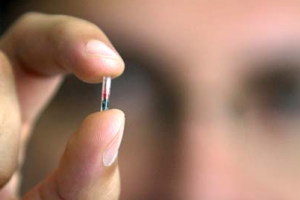Human Chip Implants: What Does the Future Hold?
Dr. Mohammed Al Muhtadi
Since the revelation that implanted microchips may cause cancer, the technology’s loudest advocates have gone silent. But between 2000 and September 2007, chip implants for humans were promoted like hotcakes. Even the U.S. Food & Drug Administration (FDA) got in on the act, approving the use of RFID tags in humans in October 2004. Are human chip implants still a possibility?
At the turn of the century, futurologists weren’t the only people predicting that humans would, in the not-too-distant future, be micro-chipped for everything from medical check-ups to credit card transactions and ID scans. As the first decade of the 21st century marched on, increasing numbers of people appeared in the news announcing that they’d been ‘chipped’, and that it made sense for the rest of humanity to follow their lead.
At the time, it was well known that the Mexican government was making wide use of the technology. More than 1,000 implants were performed on patients, and about 200 employees at the attorney general’s office had been ‘chipped’ so they could access ahigh-security office containing sensitive documents. This raised privacy considerations in the U.S.; if ‘chipping’ became widespread, would people be obligated to be ‘chipped’ in order to receive state benefits or even apply for jobs?
Ominously for those who suspected the technology could be abused, it was aggressively marketed among the young. A well publicised example took place at the Baja Beach Club in Barcelona, where management offered to inject the wealthy and the famous with chips so they could get quick admission to the VIP lounge. To make it easy for clients, the club thoughtfully supplied the services of a nurse so the implants could be performed on the premises.
On 3 March 2002, Time magazine published an article entitled ‘Meet the Chipsons’, which reported on the decision by the Jacobs family in Boca Raton, Florida, to ‘get chipped’ by VeriChip. Fourteen-year-old Derek was so enamoured with the technology that he badgered his mother, Leslie, until she agreed to get her entire family ‘chipped’. She saw the medical benefits of the decision, she said, because Derek suffered from an allergy to common antibiotics.
The article quoted Dr. Richard Seelig, VeriChip’s medical applications director, as saying that people had ‘a right to demand’ that airline pilots get ‘chipped’. “Technology has a way of moving faster than legislation, and if it comes down to a race between cyborgs and senators, guess who will win?’’, asked the article’s author, Lev Grossman. “Resistance is futile.’’
The publicity culminated with the announcement in July 2005 by George W. Bush’s
former Health and Human Services Secretary Tommy Thompson that he was planning to get ‘chipped’ in his arm in order to promote a medical information product made by VeriChip. Thompson also happened to be on the board of directors for VeriChip.
Advocates argued that, used correctly, and with sufficient safeguards in place, chip implants were ideal for sickly people or those with Alzheimer’s who might get lost and be unable to provide medical staff with lifesaving information. Those in the United Kingdom who felt that the state was too soft on criminals were heartened when it was conveniently leaked that British ministers were planning to chip offenders in order to create more space in prisons.
But every bubble eventually bursts. VeriChip, the most vocal champion of a ‘chipped’ population, came under fire in September 2007 when Associated Press released a report suggesting that VeriChip and, more worryingly, federal regulators, had ignored or overlooked studies that indicated RFID chips – or the manner in which they were implanted – might stimulate tumours in dogs and rodents.
Research showed that up to 10% of lab rats and mice that had been implanted with chips developed malignant tumours in the tissue surrounding the chip. VeriChip pointed out that lab rodents were particularly prone to developing cancer from various injections, but shares of Applied Digital Solutions, of which VeriChip was a publicly traded subsidiary, dropped sharply.
Since then, VeriChip has changed its name to PositiveID, although Scott Silverman is still at the helm. There is no indication as to whether Tommy Thompson removed his chip after the cancer scare, or whether he even had one implanted in the first place.
Meanwhile, some states have woken up to the possibility that mandatory chips could create a nightmare scenario in future. California, North Dakota and Wisconsin became the first to issue bills prohibiting the mandatory implantation of RFID tags, and Georgia and Virginia may not be far behind.
However, there is no guarantee that chip implants in humans will not become widespread in future. Some veterinarians, concerned that people will avoid ‘chipping’ their pets, have urged long-term studies on animals to determine whether the chips really do cause cancer. If those studies prove that cancer is not an overwhelming risk, or even if they are inconclusive, expect another sustained wave of pressure for widespread human ‘chipping’.
Search
News

رئيس جامعة الناصر الاستاذ الدكتور عبدالله حسين طاهش يقوم بزيارة تفقدية للجان والقاعات الامتحانية الخاصة بكلية الهندسة وعلوم الحاسوب الاثنين 24 فبراير 2025
قام رئيس الجامعة الاستاذ الدكتور عبدالله حسين ط...
جامعة الناصر تنظم ورشة حول التهيئة الرمضانية لمنتسبيها
نظمت جامعة الناصر صباح اليوم الأثنين 25 شعبان 1...
اختتام المؤتمر العلمي الأول للجامعات اليمنية في صنعاء
اختتم اليوم في العاصمة صنعاء، أعمال المؤتمر الع...
لليوم الثاني على التوالي، استمرار أعمال ونقاشات المؤتمر العلمي الأول للجامعات اليمنية.
تستمر في العاصمة صنعاء لليوم الثاني على التوالي...
بمشاركة جامعة الناصر وبحضور رسمي رفيع انطلاق المؤتمر العلمي الأول في صنعاء
صنعاء 20 شعبان 1446 هجرية الموافق 18 فبراير 202...

